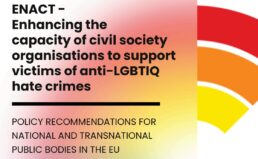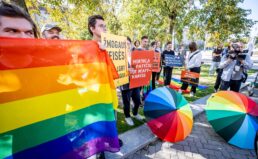Iceland is much more advanced than Lithuania in the field of LGBTI human rights, and the cooperation of Icelandic non-governmental organizations with the Icelandic government is defined in Iceland’s LGBTI Action Programme for the period of 2022 – 2025.
Daníel E. Arnarsson, Executive Director of the Icelandic LGBTI human rights organization “Samtökin”, who will take part in the discussion “The first EU LGBTIQ equality strategy 2020-2025: will the inclusion policy of LGBTIQ persons become part of Lithuania’s strategic goals?” at the National Human Rights Forum, taking place on 9 December says that implementation of Iceland’s LGBTI Action Programme for the period of 2022 – 2025 would not be possible without close cooperation between the governmental and non-governmental sectors.
Could you tell us more about the Icelandic LGBTI Action Programme for the period of 2022 – 2025? What measures does it entail?
The Icelandic LGBTI Action Programme is a vast program for the next three years. It has issues in every ministry in Iceland, from the Ministry to Justice to the Ministry of Agricultures and Fisheries. The Action Programme is in 19 segments, listing up a large amount of projects that the Government of Iceland wants to finish before 2025. It should be noticed that the Action Plan was accepted in the Parliament and of all those who voted, not a single Member of Parliament opposed it.
Approval of such an action plan must be a complicated process. Could you please explain what work goes on behind the scenes?
Sure! The Action Plan is, though it is very important, not the most complicated legislature that we have lobbied for in the Parliament. In the year of 2019 the Gender Autonomy Act was accepted in the Parliament and that process took six years of work. Our work for the Action Plan began in 2020, with meetings with the Prime ministry, and the most important thing for us was to show the true value of our organization and to be an elaborate party in the decision making process. We strengthened our bond with the Office of Equality under the Prime Ministry immensely in 2019. When it came to General Elections in Iceland, September of 2021, Samtökin sent requirements to all the political parties that were running for the Parliament. Furthermore, we evaluated all of their agenda when it came to LGBTI matters, putting pressure on them to make the subject a real priority in the elections. We gave them a timeframe to strengthen their agenda on the matter and three of the parties did write a whole new agenda on LGBTI matters. This was crucial, because then we knew that these parties would be great allies when we would later propose a change in laws or regulations.
What was your organization’s role in shaping the LGBTI Action Programme into what it is today? What recommendations your organization put forward?
Officially the Prime Ministry asked us to form a focus group. They hosted three meetings with the focus group where we could express our opinion on the Agenda. Behind the scenes it was more work for us, endless meetings with the prime ministry, report writing and evaluating what they had accomplished in the process. The Prime Ministry did a terrific job on the matter and we knew from the start that our Prime Minister was very keen on finishing the Agenda as fast as possible.
The Icelandic Government worked closely with the local LGBTI human rights organizations in drafting this plan. In your opinion, what lessons could be learned from this collaboration in Lithuania?
One thing that Iceland has over Lithuania on is the population. Iceland is very small in population and therefore the connections between parties and NGO are very tight. Of course we have built those connections very strategically over the years. When it comes to advocacy the most important thing is being reliable, at all points. If the government don’t trust that you are the experts on the matter, they will not listen. Being visible is also crucial and laying well-reasoned claims on the subject via the media and on meetings. The best friend is the phone and meeting face-to-face is also vital. The lesson to be learned is to show the share strength of LGBTI organisations to get the ears of decision makers and therefore getting to set down claims that both parties can work with.
You are going to participate at the National Human Rights Forum’s discussion on LGBTIQ Equality Strategy 2020-2025. Although Iceland is not a member of the EU, do you think that this strategy is important and should be implemented in all member states?
Absolutely. For us to get a frame to work on is very important. Also we know that many of the actions will be worked in close collaboration with us, giving us a voice and value. Even though the Action Plan doesn’t cover nearly all the tasks that need to be done it is a great starting point and the Parliament has pledged that they will follow the plan also making them a pressure to the Government.
The discussion “The first EU LGBTIQ equality strategy 2020-2025: will LGBTIQ-inclusive policy become integral to Lithuanian strategic targets?” will be held on December 9, at 15:30 – 16:45 o’clock during the National Human Rights Forum.
 This article was prepared as part of the bilateral cooperation initiative “Development of LGL and Samtokin78 Partnership: Exchange of Best Practices and Identification of Strategic Partnership Directions”. The initiative is part of the Active Citizens Fund, financed by the European Economic Area (EEA) and the Norwegian Financial Mechanisms.
This article was prepared as part of the bilateral cooperation initiative “Development of LGL and Samtokin78 Partnership: Exchange of Best Practices and Identification of Strategic Partnership Directions”. The initiative is part of the Active Citizens Fund, financed by the European Economic Area (EEA) and the Norwegian Financial Mechanisms.




